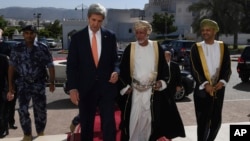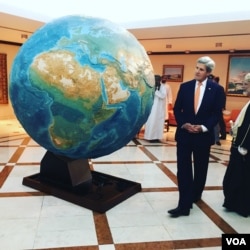Ending the war in Yemen was a "prime topic of discussion" for Secretary of State John Kerry in Oman, according to a senior administration official.
Kerry told reporters Monday he held a "very constructive discussion" with Yusuf bin Alawi, the minister responsible for foreign affairs, before also talking about the bloody and desperate situation in neighboring Yemen with Oman's Sultan Qaboos bin Said.
The absolute monarch and Kerry discussed "the importance of peace talks and getting a framework in place," the official said. "But neither side in past weeks has been willing to stop fighting."
The monarch and the U.S. secretary of state "welcomed the road map, including its sequencing, put forward by the United Nations Special Envoy for Yemen, Ismail Ould Cheikh Ahmed, to end the conflict," said State Department spokesman John Kirby in a statement.
Oman is the only Gulf state that is not part of the Saudi-led coalition against Yemen's Iran-backed Houthi rebels.
The Omani road map, based on an initiative by Kerry, calls for Yemeni President Abdu Rabu Mansour Hadi to hand power to a less divisive deputy in exchange for the Houthis withdrawing from Yemen's main cities.
"Progress is possible but only if the U.S. can exert enough pressure on Saudi Arabia to stop its aerial campaign in Yemen. This might in turn convince the Houthis and their allies that the international community is serious about wanting to bring an end to the conflict," said Michael Horton, senior analyst for Arabian affairs at The Jamestown Foundation.
Previous cease-fires have seen almost immediate violations by all sides in the conflict.
Oman as peace broker
Oman, with treaty ties to the United States stretching back to 1833, served as a bridge in secret talks between Tehran and Washington that led to last year's controversial nuclear deal between Iran and a group of world powers.
Oman has also hosted behind-the-scenes discussions between U.S. officials and the Houthis.
Horton told VOA there is "a real risk that Saudi Arabia will view the incoming Trump administration as being less well disposed to the House of Saud and in particular to its war in Yemen. This might mean that Saudi Arabia intensifies its aerial campaign in Yemen before Trump takes office."
The tempo of bombings in northwestern Yemen has been reported to have intensified in the last few days.
Oman is expected to have a key role in any negotiations, as it is viewed to some degree as a neutral and honest broker.
Oman challenges
Oman faces its own challenges, and time may be running short.
Oman's Sultan Qaboos, a veteran of the British Army, is the Middle East's longest-serving ruler since overthrowing his father in 1970. But the monarch, who turns 76 on Friday, spent most of last year undergoing medical treatment in Germany for an undisclosed illness. The sultan is divorced with no children or brothers, raising questions about who will succeed him as the head of the Busaid dynasty.
The conflict in Yemen in the past 20 months has killed an estimated 10,000 people and millions are in need of food with starvation setting in, according to the United Nations.
The majority of Yemen's 27 million people are also in urgent need of health services and the country is at risk for a significant cholera outbreak, according to U.N. agencies.
"Stabilizing Yemen is critical to regional stability and for U.S. national security," according to Horton of the independent, non-partisan Jamestown Foundation. He asserts the only ultimate beneficiary of a protracted war in Yemen would be the Sunni extremist al-Qaida in the Arabian Peninsula (AQAP), which has orchestrated numerous high-profile terrorist attacks in the divided country.
VOA’s Nike Ching at the State Department contributed to this report.














